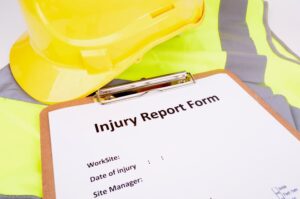Pre-Existing Injuries and Workers’ Comp Claims | An Essential Guide For Injured Employees In Indiana

Workers’ compensation provides vital financial support when on-the-job injuries keep you from working.
Unfortunately, the application process becomes much more complicated regarding pre-existing injuries and workers’ comp claims.
So, what do you do when a work-related injury worsens or aggravates a pre-existing condition? And how can a Greensburg workers’ compensation lawyer help you protect your right to receive benefits?
At Klezmer Maudlin, we aim to empower Indiana employees with the knowledge to confidently pursue a claim for maximum benefits.
Whether you have a pre-existing injury or not, a lawyer can explain your rights and the steps to take when filing a workers’ comp insurance claim in Indiana.
Schedule a Free Initial Consultation Today!
Who Can File A Workers’ Compensation Claim In Indiana?

Under Indiana law, most employers must provide workers’ compensation insurance for their employees. This means that almost all state employees can file a claim for benefits if they sustain an injury on the job.
However, some exceptions apply to this rule.
Workers ‘ compensation insurance may not cover certain types of workers, such as independent contractors and volunteers. A lawyer can explain your employment status and advise you on your legal options for seeking compensation if you do not qualify for the insurance benefits.
What Conditions Qualify For Workers’ Comp Benefits In Indiana?
According to Indiana law, a worker qualifies for benefits if they sustain an injury or develop an occupational disease while performing job-related duties, including but not limited to:
-
- Slip and fall accidents
- Repetitive stress injuries
- Forklift accidents
-
- Equipment malfunctions or defects
- Exposure to toxic substances
- Construction accidents
Typically, these injuries or illnesses must result from the employee’s job duties, and they can range from physical injuries to mental health conditions.
How Do Pre-existing Conditions Affect Benefit Claims?

Indiana makes obtaining workers’ compensation benefits a challenge in and of itself, even without pre-existing medical conditions.
However, the process can become even more complicated when an on-the-job injury affects a pre-existing condition.
The main issue with pre-existing injuries and benefit claims is determining whether or not the work-related injury worsened or aggravated the pre-existing condition.
Insurance companies will try to deny claims by arguing that the employee’s prior injury caused their current symptoms.
Common pre-existing conditions that workplace injuries can aggravate or worsen include:
- Back and neck injuries
- Arthritis
- Diabetes
- Heart conditions
A pre-existing condition does not automatically disqualify you from receiving benefits, but it can make the process more challenging.
Scheduling a case evaluation with an experienced lawyer can overcome these and other challenges to receiving benefits for your on-the-job injuries.
How Can a Workers’ Compensation Lawyer Help With Pre-existing Condition Claims?
You need legal support when employers or insurance companies claim that your condition was pre-existing.
A workers’ compensation lawyer can help by:
- Gathering medical evidence to prove that the work-related injury worsened or aggravated the pre-existing condition
- Negotiating with insurance companies to secure fair and full benefits
- Appealing a denied claim and representing the employee in court if necessary
- Advising employees on their rights and ensuring they are not taken advantage of by their employer or insurance company
At Klezmer Maudlin, our attorneys have years of experience handling claims involving pre-existing injuries. We understand the complexities of these cases and are dedicated to fighting for the rights of injured employees in Indiana.
How Do I Prove My Pre-existing Condition Has Worsened By My Work-Related Injury?

To successfully prove that a work-related injury exacerbated your pre-existing condition, you will need strong medical evidence, including but not limited to:
- Medical records and reports from before and after the workplace injury
- Expert testimony from qualified medical professionals
- Test results showing changes in the pre-existing condition following the work-related injury
You should also document any changes in your symptoms or ability to perform daily tasks before and after the workplace injury. A workers’ compensation lawyer can help you gather and present this evidence to support your claim.
How Much Is My Claim Worth?
In typical cases not stemming from pre-existing conditions, workers’ compensation benefits in Indiana include wage replacement and coverage for medical expenses related to the work injury.
These benefits begin seven days after the claim is approved, usually paid within 15 days of the first missed work day. If the injury keeps you from working for more than 21 days, then the benefit amount will include payment for the first week of work.
When it comes to pre-existing injuries, recoverable compensation will only include treatment for the injury itself, not the condition it aggravated.
For example, if an employee with arthritis sustains a back injury at work, they may be entitled to medical expenses related to the back injury but not for treatment for preexisting arthritis unrelated to the work accident.
Or, if a car accident caused soft tissue damage in the neck and worsened a pre-existing degenerative disc disease, the employee may be eligible for compensation related to the neck injury but not for treatment of the disc disease.
The key to understanding eligibility for compensation is hiring a lawyer who can accurately assess the scope of your injuries, gather appropriate evidence, and fight for your rights to receive fair compensation.
How Long Do I Have To File a Claim?
In Indiana, employees have two deadlines to consider if they want to receive workers’ compensation benefits regardless of a pre-existing condition:
- Employees must report the injury or illness to their employer within 30 days of its occurrence or discovery. Otherwise, they may lose their right to compensation.
- Employees have two years from the date of the injury or when they first became aware of their occupational disease to file a claim with the Workers’ Compensation Board of Indiana. Failing to meet this deadline could result in losing out on benefits.
These strict filing timelines highlight the importance of seeking legal counsel as soon as possible after a workplace injury, especially if you have a pre-existing medical condition.
A workers’ compensation lawyer can ensure that your claim is filed correctly and within the necessary timeframes to protect your rights to benefits.
How Long Does It Take to Receive My Insurance Benefits?
In claims not involving pre-existing conditions, workers’ comp benefits in Indiana can take several weeks to receive. Workers must file the claim, then workers comp must process and approve it before the worker receives payments.
However, a preexisting condition may make a claim take longer as it may require more evidence and negotiations. Sometimes, a denied claim may need to go through an appeal, which can also add time to receiving benefits.
Pre-Existing Injuries And Workers’ Comp Claims FAQ
How do I know if my pre-existing condition was worsened by work?
A medical professional can make this determination. With their expertise and the help of an experienced workers’ compensation attorney, you can gather and present the evidence needed to prove your claim.
What if my employer denies my pre-existing condition claim?
If your employer’s insurance company denies your claim, seek legal advice as soon as possible. An attorney can review your case and advise you on the best course of action, which may include appealing the decision or filing a lawsuit.
How long can I receive workers’ comp benefits in Indiana?
The state offers up to 500 weeks of benefits for temporary total disability and permanent and partial disability. However, these benefits may not extend to cover your pre-existing condition, only the injury sustained at work. Consult a lawyer to understand your rights and the potential benefits you may be entitled to.
How much is a workers’ comp claim worth?
An attorney can assess your case and help you understand potential compensation amounts that include medical expenses, lost wages, and permanent disability benefits. They can also negotiate with insurance companies to ensure you receive fair and full injury benefits.
Am I entitled to non-economic damages for my pre-existing condition?
Non-economic damages, such as pain and suffering, are not typically awarded in these cases. However, if your pre-existing condition was worsened due to workplace negligence or intentional actions, you may have grounds for other legal options to recover damages for the harm you’ve suffered.
Can I get fired for filing a workers’ comp claim with a pre-existing condition?
No, it is illegal for an employer to retaliate against an employee for filing a workers’ compensation claim. If you believe that your employer has fired or taken other adverse actions against you because of your injury and subsequent claim, consult a lawyer to advise you on the best legal options for your situation.
I have multiple pre-existing conditions. Can I still file a workers’ comp claim?
Yes, even if you have multiple pre-existing medical conditions, you may still be eligible for workers’ compensation benefits if your work-related injury or illness worsens any of them. Discuss the details of your situation with an attorney who can help determine the best course of action for seeking compensation.
Filing a Workers’ Comp Claim With Pre-Existing Conditions? Contact Klezmer Maudlin For Comprehensive And Compassionate Legal Support
Nothing is more stressful than worrying that your pre-existing condition may affect your eligibility for workers’ compensation benefits.
At Klezmer Maudlin, our experienced attorneys are well-versed in handling complex cases involving pre-existing conditions and can provide you with the comprehensive and compassionate legal support you need.
Contact our law firm online or at (317) 569-9644 to schedule a consultation and learn how we can help you obtain fair compensation for your work-related injuries and illnesses.

